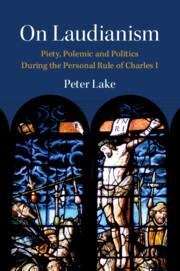Book contents
- On Laudianism
- Cambridge Studies in Early Modern British History
- On Laudianism
- Copyright page
- Contents
- Acknowledgements
- Abbreviations
- Introduction
- Part I Laudianism: Where It Came From
- Part II Laudianism: What It Was
- Part III Laudianism: What It Wasn’t
- Chapter 20 Order, Puritanism and the State of the English Church
- Chapter 21 Puritan ‘Privacy’, or the Forms of Puritan Voluntary Religion Anatomised
- Chapter 22 A Religion of the Word and the Question of Authority
- Chapter 23 Puritanism, Popularity and Politics
- Chapter 24 Of Moderate Puritans and Popular Prelates
- Chapter 25 The Puritan Threat, the Church of England and the Personal Rule as a Period of Reformation
- Part IV Laudianism and Predestination
- Part V Laudianism as Coalition: The Constituent Parts
- Conclusion
- Index
Chapter 24 - Of Moderate Puritans and Popular Prelates
from Part III - Laudianism: What It Wasn’t
Published online by Cambridge University Press: 05 October 2023
- On Laudianism
- Cambridge Studies in Early Modern British History
- On Laudianism
- Copyright page
- Contents
- Acknowledgements
- Abbreviations
- Introduction
- Part I Laudianism: Where It Came From
- Part II Laudianism: What It Was
- Part III Laudianism: What It Wasn’t
- Chapter 20 Order, Puritanism and the State of the English Church
- Chapter 21 Puritan ‘Privacy’, or the Forms of Puritan Voluntary Religion Anatomised
- Chapter 22 A Religion of the Word and the Question of Authority
- Chapter 23 Puritanism, Popularity and Politics
- Chapter 24 Of Moderate Puritans and Popular Prelates
- Chapter 25 The Puritan Threat, the Church of England and the Personal Rule as a Period of Reformation
- Part IV Laudianism and Predestination
- Part V Laudianism as Coalition: The Constituent Parts
- Conclusion
- Index
Summary
The chapter examines the puritan claim that ‘moderate puritan’ was an oxymoron; that even self-professedly moderate or conforming puritans were in fact the carriers of an ideology subversive of all order in church and state. Indeed, the Laudians claimed that those puritans who at least pretended to conform were in fact more dangerous than out-and-out non-conformists, since the latter identified themselves and could thus be the more easily disciplined or removed. The others represented a fifth column, far harder to detect or discipline, and thus able to undermine the church from within. Within the episcopal hierarchy, the correlative of the moderate puritan was the so-called popular prelate, someone who cared far too much about his reputation amongst the godly and thought that the unity of the church could best be preserved by accommodating various sorts of puritans rather than by subjecting them to firm episcopal government. Such men represented a threat to the church almost as great as the puritans themselves. Here the figures of bishops like Williams of Lincoln or Hall of Exeter, and then Norwich, could be discerned between the lines of various Laudian diatribes.
- Type
- Chapter
- Information
- On LaudianismPiety, Polemic and Politics During the Personal Rule of Charles I, pp. 317 - 336Publisher: Cambridge University PressPrint publication year: 2023

